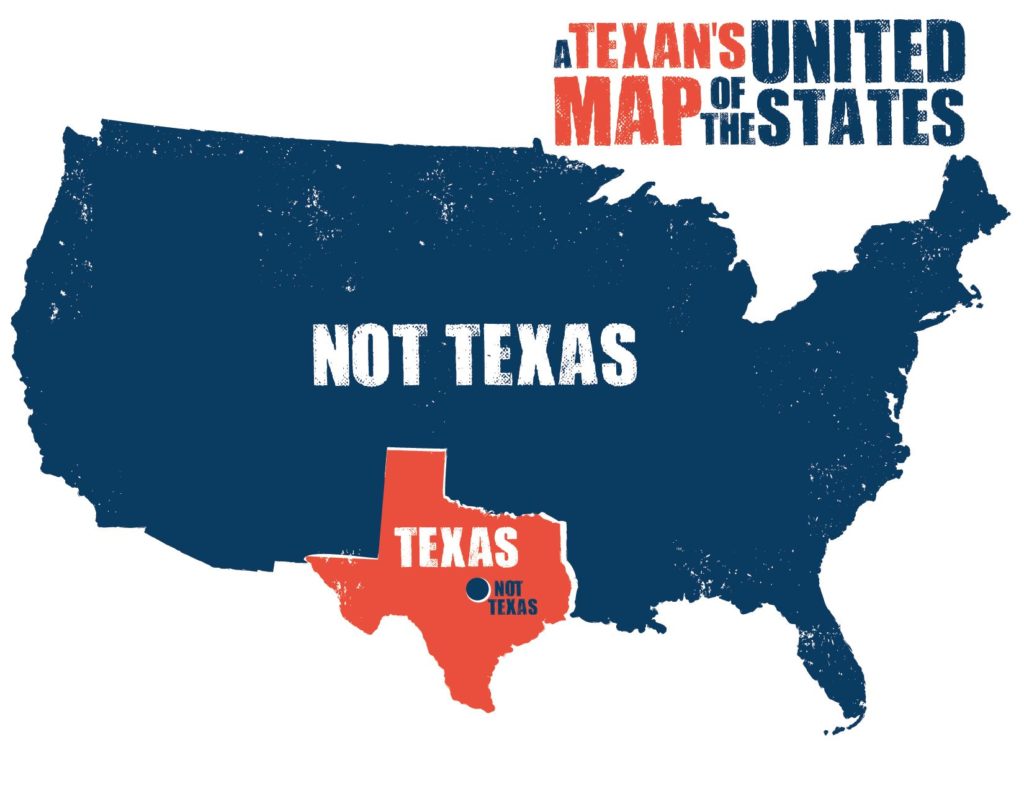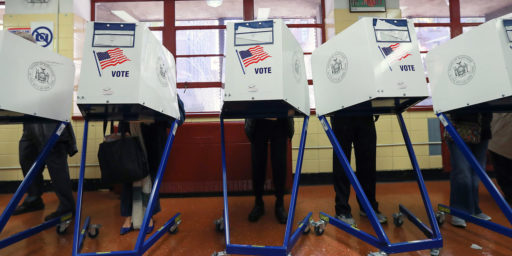Does the Constitution Cover Texas?
The Lone Star state is making up its own rules.

Years ago, there was an ad campaign with the slogan “Texas. It’s Like a Whole Other Country.” It’s getting more true with every passing day.
Two developments from yesterday are in the news.
Texas Tribune (“Texas can reject mail-in ballots over mismatched signatures without giving voters a chance to appeal, court rules“):
If they decide the signature on the ballot can’t be verified, Texas election officials may continue rejecting mail-in ballots without notifying voters until after the election that their ballot wasn’t counted, the 5th U.S. Circuit Court of Appeals ruled Monday.
The appeals court halted a lower court’s injunction, which had not gone into effect, that would have required the Texas secretary of state to either advise local election officials that mail-in ballots may not be rejected using the existing signature-comparison process, or require them to set up a notification system giving voters a chance to challenge a rejection while their vote still counts.
Requiring such a process would compromise the integrity of the mail-in ballots “as Texas officials are preparing for a dramatic increase of mail-in voting, driven by a global pandemic,” reads the Monday opinion issued by Judge Jerry E. Smith.
“Texas’s strong interest in safeguarding the integrity of its elections from voter fraud far outweighs any burden the state’s voting procedures place on the right to vote,” Smith wrote.
Before mail-in ballots are counted, a committee of local election officials reviews them to ensure that a voter’s endorsement on the flap of a ballot envelope matches the signature that voter used on their application to vote by mail. They can also compare it to signatures on file with the county clerk or voter registrar that were made within the last six years.
The state election code does not establish any standards for signature review, which is conducted by local election officials who seldom have training in signature verification.
Voters must be notified within 10 days after the election that their ballot was rejected, but state election law does not require affording them an opportunity to challenge the rejection, the appeals court ruling noted.
So local election officials can look at ballots, presumably knowing for whom a person has voted, and decide that the signature on the ballot doesn’t match the one on file? What could possibly go wrong?
Even if they’re acting honorably, most of us have signatures that very rather considerably—especially since we don’t write much by hand anymore. I have a very neat version that I tend to use on official documents so long as I don’t have to sign more than a handful of times in any short period. But, unless I was aware that I was expected to match my “official” signature, I might well not do so.
Regardless, one would think a due process right inhered. Obviously, if the ballot were received on or near the last day it would count, it would be unreasonable for election officials to have to track down the would-be voter. But weeks out?
Oddly, the suit was filed way back in August 2019.
The lawsuit claims at least 1,873 mail-in ballots were rejected on the basis of mismatched signatures during the 2018 general election; at least 1,567 were rejected in 2016.
On Sept. 8, U.S. District Judge Orlando Garcia ruled that the state’s process for matching signatures “plainly violates certain voters’ constitutional rights,” and ordered the state to either abandon the practice or come up with some mechanism that lets voters get their ballots counted.
The injunction has been under an administrative stay by the 5th Circuit since Sept. 11, three days after it was issued, and will now remain on hold while the state challenges the underpinnings of Garcia’s decision.
Plaintiffs said they will now push counties to voluntarily give early notice to voters whose ballots are rejected for signature-match issues, allowing them a chance to rectify the situation and let their vote count.
“It will affect this 2020 election, so voters will not be notified in time, and so I think the main thing we’re trying to do now is notify counties that ballot boards are not required to give pre-election day notice, but they can,” said H. Drew Galloway, executive director of MOVE Texas, a plaintiff. “We encourage them to follow the original intent of the lower courts here so folks (whose ballots were rejected) can go vote in person, or contest that decision.”
Let’s stipulate that we’re talking about a practice that has historically had a negligible impact. In 2016, Donald J. Trump received 4,685,047 votes in Texas, compared to Hillary Clinton’s 3,877,868; Gary Johnson’s 283,492; Jill Stein’s 71,558; and 51,261 for “Others.” The Texas ballots rejected in 2018 and 2016 combined are a tiny fraction of those who voted for someone other than the four candidates of whom you’d likely heard.
But, of course, that was in a contest where the outcome was a foregone conclusion—a big win by the candidate of the party likely in charge of the counting in most precincts. The incentives are very different this time.
Meanwhile, NBC (“Texas social workers can now turn away LGBTQ, disabled clients“) reports:
The state Board of Social Work Examiners voted unanimously to change a section of its code of conduct last week following a recommendation from Gov. Greg Abbott, a Republican, to remove protections for sexual orientation, gender identity and disability. Abbott’s office said the change was suggested because the board’s nondiscrimination clause went beyond the state’s policy on social work, according to The Associated Press.
“It’s not surprising that a board would align its rules with statutes passed by the Legislature,” Renae Eze, a spokeswoman for Abbott’s office, said.
Officials and the state Board of Social Work Examiners is now facing backlash for the decision, with some advocacy and professional organizations saying it could put already vulnerable disabled and LGBTQ people at a greater risk.
After the policy change became public, seven advocacy groups released a joint statement condemning the move.
First off, as a sheer matter of politics, this strikes me as a bizarre move. Texas is trending bluer every day. Why enact a policy by fiat that would be more at home in Alabama or Mississippi?
Second and more importantly, we have a whole series of United States Supreme Court decisions that have interpreted the Equal Protection Clause of the 14th Amendment and the Civil Rights Act of 1964 as protecting these groups. Why don’t those rulings apply to Texas?






Please note that the 5th U.S. Circuit Court of Appeal is a federal court. So no, it’s not just a Texas thing.
Republican judges are a threat to democracy.
See also yesterday’s Pennsylvania ruling by the Supreme Court. With ACB on the Court, the median vote lies to the right of Roberts – who is already very hostile to voting rights himself.
Because with ACB on the Supreme Court, they may not even apply to the country any longer.
Any time there is a rightward shift in the makeup of SCOTUS, these kinds of attempts are being made.
@drj:
Yes. I haven’t read the full opinion but they overturned a District Court ruling and therefore upheld the traditional deference to state institutions in conducting elections. I just don’t see how this is congruent with the long line of SCOTUS rulings on voting rights and due process rights.
Welcome to my world.
You know this but I’ll repeat it: Republican and right wing politics boils down to three issues: Abortion, guns and grievance.
It is prevalent in Texas just as it is in the rest of the South. Grant made a grave error in ending Reconstruction.
@James Joyner:
Republican judges don’t care about votings rights and due proces (or even states’ rights) when it comes to giving the GOP an electoral advantage.
I think this is what some us have been saying for quite a while now – and what has made the Garland/ACB situation even more galling than it otherwise would have been.
@James Joyner:
That is because you haven’t been paying attention. Post-Shelby, the conservatives on the Court have established a new line of cases on voting rights – they don’t exist is we think you are going to vote against Republicans. Vote suppression of “them” is ok.
With ACB about to be confirmed, that will intensify as none of them outside Roberts care about the Court’s legitimacy or standing. The American conservative mindset is trending more and more towards and into fascism.
Also, please note that the Republican judges on the Supreme Court (minus Roberts) were quite ready to strike down this “traditional deference to state institutions” in the Pennsylvania case I mentioned above.
“Traditional deference to state institutions” is a principle that is only held situationally among Republican judges. It’s not hard to guess in which situations it is, and in which it isn’t.
I keep reading this sentence and can’t follow the logic. It makes zero sense as a sentence. Or a thought.
@James Joyner: I’m curious as to whether you still believe the Republicans on the court were correct when they nutted the Voting Rights act? At the time I recall you insisting that efforts to stop voters from casting ballots in the sanctioned states was ancient history and they most certainly would not resort to suppression efforts going forward.
James, ever since Bush v Gore, it’s been clear that the Right in this country has decided that democracy has got to go.
At this point, you can look around and see that they are quite openly saying that.
@Scott: The surest way to prevent voter fraud is to not allow anyone to vote.
@James Joyner:
James, I’m not trying to drag you, but what in the Sam Hill are you talking about given the Robert’s Court Record on Voting Rights? I would say that said decision was, in fact, completely in line with their pattern of thinking (including even the PA ruling yesterday which was in deference to State Authority to set voting rules).
Again, I hate to remind folks, but so long as election laws are equally applied across race and gender (and other protected classes) the Constitution does not create any real inherent right to vote (at least not in the same way as other positively declared rights). See, for example, https://theconversation.com/the-right-to-vote-is-not-in-the-constitution-144531
Key passage of the analysis:
Well, I’m not surprised.
@mattbernius:
And I got my voting cases mixed up. I forgot that PA is a case where the final State Level ruling was by the State Courts versus the Legislature. Granted, still a State Institution. But it’s also clear that the Conservative Majority of the court sees that as a less legitimate source of state power than the Legislature (and it’s a sign that at least 4 of the current justices would definitely support the Texas ruling).
You have to give Republicans credit for long laid plans. Evil. But long laid. They started beating the drum about vote integrity years ago. It’s now an accepted thing on the Right that Ds only win with vote cheating. And it’s consistent with their moralistic view of everything that it’s better a thousand legitimate votes go uncounted than that one improper ballot be counted. It was probably a brown person anyway. And the vote is sacred, don’tjaknow, it must not be defiled with cheating. One improper ballot is too many. /s Why do I think that in TX voting officials may more strictly scrutinize signatures with Hispanic surnames?
The Koch Bros stood up the Federalist Society almost forty years ago to select like minded lawyers, groom them, and feed them into the courts. Twelve of the seventeen active members of the Fifth Circuit were appointed by Reagan, W. Bush, or Trump. The Federalist Society defines and supports “Originalism”. “Originalism” is a machine designed to allow overturning precedent. It is a claim to being able to discern the *real* meaning of the Constitution by cherry picking any contemporary writing they can find for bits that support their position. My favorite, albeit unsuccessful, example is the guy who found an old dictionary that offered as an example of “bear”, ‘to bear arms, as in a coat.’ This was clear proof that it was common practice at the time to carry a pistol in your coat pocket. This was destined for collection into the Federalist Society Annotated Bibliography of Conservative and Libertarian Legal Scholarship, until about a hundred people publicly shouted ‘coat of arms, you idiot.’
Whatever barking nonsense Alito declares is the real meaning of the Constitution obviously overrides any precedent, which must, by Federalist Society definition, have been improperly decided, as the Constitution clearly supports Alito’s “Originalist” interpretation, according to Alito and four FS clones.
It’s been a long time since I voted in Washington, but the last time I did, the signature went either on the outside envelope or the outside of the security envelope so that a vote that would not be validated would not be revealed.
That people are not notified that their ballot was not counted until after election validation is problematical, though. Over the whole that feature is problematical. Fortunately, voters in Washington live in a state where suppression of voting is not an issue. It might be sad if Texans don’t but as the saying goes
This morning the NYT has a piece on the SC hearing of two Trump immigration policy appeals. It is noted that if Biden wins, the policies will be reversed and the court case likely withdrawn.
Frankly, I believe that Biden should reverse the policies, but continue the appeal and force the SC to rule. A judgement is a win-win. A ruling against the Trump policies will establish this courts limits on executive action. If they rule in favor of Trump, that opens the door for Biden to use similar executive action to promote liberal policies, while congress can amend the immigration laws to deny future presidents from trying Trumps tricks.
Why would it be unreasonable? When does the election have to be certified by?
When the Washington governor’s race came down to a tiny handful of votes, officials were tracking down voters with mismatched signatures for weeks. We survived not knowing when the vote would finish. We then had multiple recounts.
If you cast a provisional ballot at a polling place, due to whatever reason, it isn’t thrown out at midnight on the night of the election. Mismatched signatures should be treated the same — go through the work when they can sway an election.
No, that is not how it works. Every state in the nation has a secret ballot requirement written to the state constitution or enacted through state laws. What you’re suggesting is illegal everywhere to include Texas.
I haven’t surveyed every state, but of the half-dozen that I’m aware of (to include Texas), the signature verification takes place on the outside of the mailed envelope. So the signature is adjudicated before the envelope is even opened.
Here in Colorado – which arguably has the best and most robust early and mail voting system in the country, the signature verification rules are quite similar to Texas. The difference here is that if a signature is rejected, the voter is notified and given some time to prove it’s really them. This happened to my wife in 2018. She was out of town and forgot to sign her ballot envelope. So with her permission, I attempted to sign some semblance of her signature for her and then dropped it off with mine at the local ballot drop box. I obviously didn’t do a good job since her ballot was rejected for a signature mismatch. She had to go into the county voting office, present her ID and sign an affidavit that was her vote and it was valid.
I just looked it up and only 18 states require that voters be notified when there is a missing signature or signature discrepancy and are then given an opportunity to correct it.
Note that a lot of blue states are not on that list, which means if there is a signature mismatch they will toss your ballot and you’ll never know.
Because this change was for a code of conduct/code of ethics for social workers. It doesn’t negate any law or ruling and is unlikely to have any material effect on anything.
I looked up the equivalent for my home state of Colorado and the regulations simply state that social workers must conform to a recognized professional code of ethics for licensure. There’s nothing specific about standards for protected groups. Is Colorado violating the 14th amendment and SCOTUS rulings? No.
As far as your subheading goes, Texas, like all states, can “make up their own rules” about many things to include the rules and procedures for elections and the ethical standards for professional licensing. There is nothing special about Texas in either of these examples.
@Andy:
Wisconsin is not on that list. When I voted in the primary (by mail), my witness neglected to include her address with her signature. I got a call from city hall letting me know this, and asking where the witness lives. The envelope was corrected, and sent on to be counted.
@Andy:
You’re too trusting. A corrupt election official looks at an envelope Letitia Johnson, looks up the voters signature and assumes the voter is black. Sorry, sigs don’t match and the vote is tossed.
@Sleeping Dog:
No, these things are never decided by individuals.
I looked up the Texas statute and signature verification is done by committee at the county level. The committee membership is composed of equal numbers of members which are drawn from lists submitted by the political parties, and the presiding committee judge is selected by the party that got the most votes at the county level for governor in the previous gubernatorial election. So in a Democratic majority county, the judge will be a Democrat, in a GoP county, the judge will be aligned with the GoP and all other members will be equally split between the parties.
And then there are poll watchers which monitor what is going on and can make objections if they think something illegal or against proper procedure.
It’s very similar in most states that I’m familiar with and the processes and oversight are specifically designed to prevent the kind of corruption that you are alleging.
Side note: I just noticed the slam on Austin in the lead graphic of the post.
@Steven L. Taylor:
But is it though?
@mattbernius: Fair point.
Reverse the order of these sentences and you have answered your own question.
@Andy:
These are excellent points. I don’t know enough about the state of enforcement to really have a clue on this.
Without looking it up, I am skeptical that enforcement is vigorous across the states if only for budget reasons.
I also recall reading a recent article about systemic voter fraud that went on for years in a rural, conservative county in Georgia.
I may do a little research later.
@MarkedMan: My argument was more fundamental: It’s simply unconstitutional for a federal statute to apply restrictions to some states and not others. So, Shelby County was quite fixable: the Congress could specify conditions applicable to all states under which judicial scrutiny of election districting applied. Or, better yet, simply subject all state voting districts to judicial scrutiny.
@Steven L. Taylor: Ha. I didn’t notice it, either. There are several versions of the graphic out there and it took a while to find one large enough so I didn’t parse it closely.
It’s impossible to fix, as long as Mitch McConnell is running the Senate. The House passed a fix long ago but MM won’t allow a vote on it.
@Steven L. Taylor: @James Joyner: I don’t know what took you guys so long, I saw it right off the bat. 😉
@James Joyner: James, all due respect, but my recollection is that you were also making the claims that “times had changed, and the sanctioned states weren’t going to do this anymore”, or words to that effect.